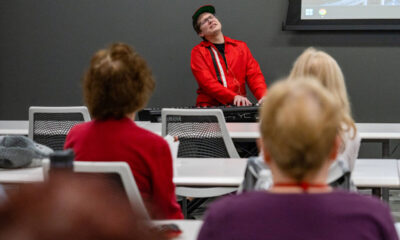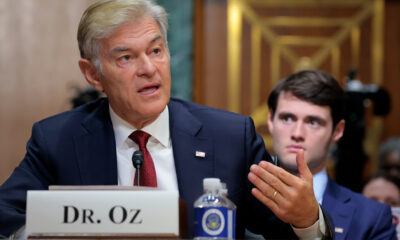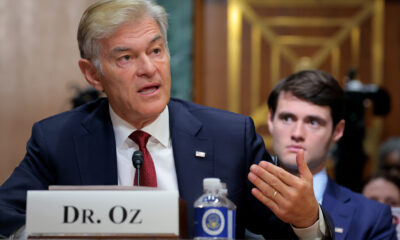Health
Healthcare Leaders Discuss AI Innovations at HLTH 2025 Conference

At the HLTH 2025 conference in Las Vegas on March 19-22, healthcare executives outlined their visions for navigating a rapidly evolving healthcare landscape. They emphasized the role of technology in enhancing workflows and streamlining administrative tasks through automation and data integration.
Karen Walker Johnson, CEO of Clever Care, shared insights from her extensive career that shaped her approach to Medicare beneficiaries. She highlighted the importance of culturally competent care and how her company’s benefits design harmonizes Eastern and Western medicine practices, particularly acupuncture. Walker Johnson underscored the necessity for providers to communicate in the languages of their members, ensuring a more inclusive healthcare experience.
In a discussion about operational efficiency, Michael Rao, President of Smarter Technologies, elaborated on how the company is enhancing capabilities and reducing friction for healthcare providers. His remarks focused on the strategic initiatives that are enabling smoother interactions within the healthcare system.
Dr. Ruben Amarasingham, CEO of Pieces Technologies, detailed the acquisition strategy behind the partnership with Smarter Technologies. He explained how this collaboration aims to leverage technology for improved patient outcomes and operational efficiency.
The conversation continued with insights from Brad Blakey, Chief Revenue Officer at HealthSnap. He provided an overview of collaborative efforts with partners like Sentara Health and University Hospitals to identify and assess patients for specific health programs, showcasing the potential for targeted interventions.
Customizing Clinical Experiences
Nikhil Buduma, CEO and Co-founder of Ambience Health, discussed the company’s work with hospitals, health systems, and Accountable Care Organizations (ACOs) to enhance clinical workflows via Electronic Health Records (EHRs). He emphasized the need for tailored solutions, recognizing that physicians have varying workflows. Buduma also highlighted collaborations with academic medical centers, particularly the renowned Cleveland Clinic, to optimize the clinical experience for healthcare providers.
Furthermore, Jeff Bak, President and CEO of Imagine360, addressed the rising costs in the health insurance sector. He introduced several program offerings designed to provide more options for self-insured employers and unveiled a new pharmacy benefit program aimed at reducing expenses for consumers.
At the forefront of technological advancements, Carolyn Jasik, Associate Chief Clinical Officer at Verily, presented a direct-to-consumer telemedicine application that connects users with licensed physicians. This service not only facilitates consultations but also aggregates users’ medical records, enabling the provision of informed medical advice. Jasik also introduced Violet, an AI health query tool designed to assist consumers in navigating their health inquiries.
The discussions at HLTH 2025 underscored the critical role of technology in transforming healthcare delivery and enhancing patient experiences. As these leaders continue to innovate, their insights will likely shape the future of healthcare systems globally.
-

 Technology5 months ago
Technology5 months agoDiscover the Top 10 Calorie Counting Apps of 2025
-

 Health3 months ago
Health3 months agoBella Hadid Shares Health Update After Treatment for Lyme Disease
-

 Technology7 days ago
Technology7 days agoOpenAI to Implement Age Verification for ChatGPT by December 2025
-

 Health3 months ago
Health3 months agoErin Bates Shares Recovery Update Following Sepsis Complications
-

 Technology4 months ago
Technology4 months agoDiscover How to Reverse Image Search Using ChatGPT Effortlessly
-

 Technology3 months ago
Technology3 months agoElectric Moto Influencer Surronster Arrested in Tijuana
-

 Technology1 month ago
Technology1 month agoDiscover 2025’s Top GPUs for Exceptional 4K Gaming Performance
-

 Technology5 months ago
Technology5 months agoMeta Initiates $60B AI Data Center Expansion, Starting in Ohio
-

 Technology5 months ago
Technology5 months agoRecovering a Suspended TikTok Account: A Step-by-Step Guide
-

 Health3 months ago
Health3 months agoAnalysts Project Stronger Growth for Apple’s iPhone 17 Lineup
-

 Health5 months ago
Health5 months agoTested: Rab Firewall Mountain Jacket Survives Harsh Conditions
-

 Lifestyle5 months ago
Lifestyle5 months agoBelton Family Reunites After Daughter Survives Hill Country Floods





















